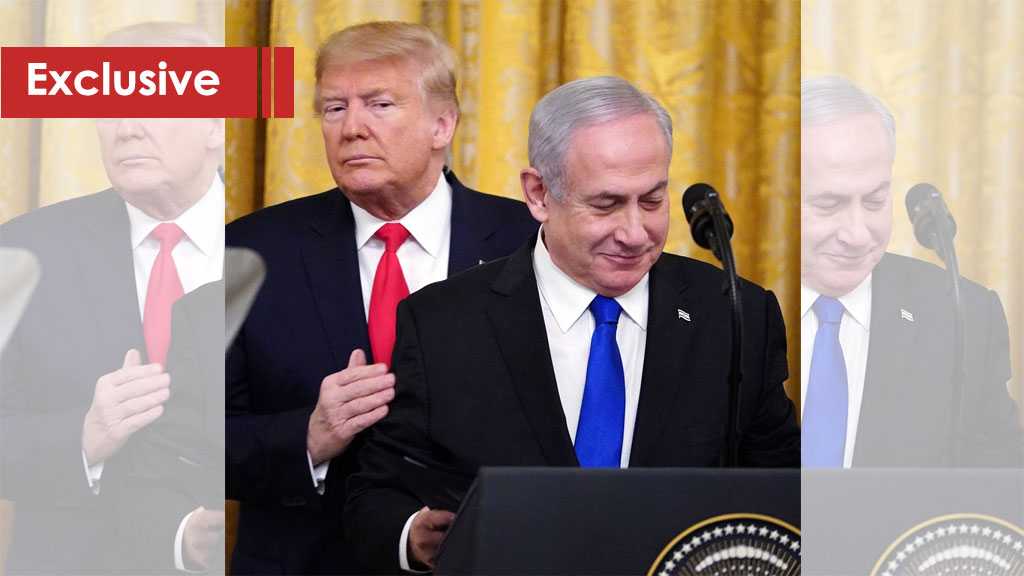Netanyahu Follows Trump’s Footsteps: Political Downfall, Internal Crisis, and Attempt to Bridge the Gap

By Ali Abadi
The recent developments in the Zionist entity reopen the discussion regarding the extent to which this entity is influenced by the US policy as well as the changes inside the United States.
Since Trump’s failure in the US Presidential Elections, the countdown to Benjamin Netanyahu’s downfall has started -who represents the ‘Israeli’ version of Trump’s personality- even though the former was able to reproduce his leadership via three consecutive elections, and prepared to a fourth round to fortify his position against probes in cases of corruption, and to fight the possibility of moving him away from the political scene through a rival party coalition. However, Netanyahu’s ploys didn’t survive in front of the results of the recent war with Gaza, which turned the political atmosphere inside the occupation entity to the extent that Netanyahu’s government was found responsible or losing the deterrence with Gaza, not to mention his weakness to handle the resistance and its growing might.
Herein, we should notice the relative comparison between the American and the ‘Israeli’ arenas:
On the one hand, the extravagance of America’s right wing led to dangerous division that caused an intense desire among all of Trump’s opponents [including some of the Republican party members] to get rid of him via ballot boxes, so they voted majorly against the far-right policies [represented by Trump] more than to support his rival Biden and his electoral program. And in the ‘Israeli’ arena, the right policies led to attractions from within the Zionist society, not between the left and the right, but within the right itself. A dominant agreement emerged that Netanyahu is sticking to power at any price, even if it led to a ‘civil war’, and that he is using Zionist religious parties that exchange with him the electoral services and well as the governmental benefits.
On the other hand, it happened previously that the personalities of Trump and Netanyahu have been linked to each other, in the course of unprecedented similarity in political tendencies of both sides regarding several issues. Trump’s failure in the US has motivated many ‘Israeli’ politicians to think about a way to get rid of his closest ally, Netanyahu. However, they didn’t possess the required energy to unite. Then came the recent confrontation with the Palestinians to uncover the weak structure of the entity as well as the policies of Netanyahu’s government. The decision was among several political parties to scapegoat him based on the rule of preserving the rightist policies that are threatened with the strong Palestinian uprising on the one hand, and the harmony with the American policies as much as possible on the other hand. Hence, the Zionist right settlement scheme would be saved, while Netanyahu’s attempts to shake the alliance with the US due to his objection of its return to the nuclear deal with Iran would fail.
Separation
Both American and ‘Israeli’ societies suffer from not yet hidden political, ideological, and ethnic divisions. Both societies need to absorb the tension from time to time via changing the top of the pyramid. This is one issue. Another remarkable one is that ‘Israel’ didn’t succeed for long in staying away from the requirements of the American interests in the region. And without harboring hopes on a major separation between the two sides, we witness a sort of coldness in relations due to three main points over the past three decades.
First: With launching the Madrid Conference for settlement in the region in the beginning of the 1990s after the US-led war in Kuwait, when Isaac Shamir [Likud] government objected to the principle of establishing an independent Palestinian state, but the Zionist entity’s need for the US financial support to contain the Jewish migration from the Soviet Union and other places pushed ‘Israel’ to reduce its objections and conditions. Washington was able, through guaranteed loans worth billions of dollars, to tame the ‘Israeli’ policy in favor of its wider interests. Then, Shamir was displaced from the ‘Israeli’ scene, and was succeeded by Isaac Rabin [Labor Party] to lead the Oslo track which happened to become later the Palestinian Authority in Gaza and Ariha. However, after the assassination of Rabin in 1995, the abilities of the most harmonized Zionist parties with the US policy declined on the level of their potential to attract, and the base of the far-right parties, which reject the issue of ‘Two-state-solution’ or freezing the settlement activity grew, especially in the aftermaths of the major migration from the previously-known Soviet Union and other places. This led to a change inside the Zionist society, in addition to the structure of its successive governments.
Second: Netanyahu’s impediment of Barack Obama’s attempts to revive negotiations with the Palestinian Authority based on freezing the settlement activity in the West Bank, and then the US signing of a nuclear deal with Iran in 2015. Netanyahu objected to it publicly and inside the US congress in a famous speech. Meanwhile, the dispersion within Netanyahu’s rival ‘Israeli’ parties didn’t allow the formation of a change that suits the US regional policy. Trump came to power in 2016 to revive Netanyahu’s hopes about change that he didn’t dream about from the part of the American orientation on other levels [such as moving the US embassy from Tel Aviv to al-Quds, recognizing the ‘Israeli’ sovereignty in the Golan, supporting the settlement activity in the West Bank, cutting funds of the Palestinian refugees’ UNRWA agency, shutting the office of the Palestine Liberation Organization in Washington, and encouraging the ‘Israeli’ normalization with Arab states regardless to the Palestinians.] A parallel US shift took place when Trump left the nuclear deal with Iran.
Third: Biden’s rising to power in Washington, which modified the ‘Israeli’ expectations. This is not limited to some differences regarding the traditional support of ‘Israel’ between America’s Republican and Democratic parties. The truth is that a change started to be witnessed in the public American mood in which a new political generation in the US, and inside the Democratic party is more liberal than its predecessors and doesn’t grant ‘Israel’ an ultimate support. It also cannot digest the rightist ‘Israeli’ thinking to ban the establishment of a Palestinian state, and the Palestinian people’s right to live on their land within internationally recognized borders. The ‘Israeli’ narrative, which has dominated the minds of the US elite over several decades regarding the right of Jews alone to establish their national Jewish state, has turned less tempting to many Americans. Additionally, the pro-Palestinian activism on social media platforms managed to breach the pro-‘Israel’ traditional media, in which Facebook and Twitter’s restrictions couldn’t curb this activism that was crystal-clear during the latest round of ‘Israeli’ aggression. It also scored important attractions in English and other foreign language.
Moreover, the Biden administration prioritizing of returning to the nuclear deal with Iran formed a separation from Netanyahu government’s orientations. He has started hinting to moving without an agreement from Washington, a matter that is not only underestimated in the US, but also among ‘Israeli’ milieus that are worried about losing the strategic alliance with the US.
Back to the house of obedience
After this third stop, ‘Israel’ returns to the so-called American ‘house of obedience’ or to adapting with the major US interests. This return is based upon avoiding confrontation with the US policies and their regional requirements to deal with the nuclear Iran in particular, reducing tension and difference with the American administration when dealing with the flaming Palestinian issue nowadays. However, it is not necessarily at the expense of the rightist tendencies regarding the settlement scheme that is the core of the Zionist project. The official US interest intersected with the internal ‘Israeli’ parties’ interests to remove Netanyahu from the scene. The US administration will take advantage of this shift in an attempt to revive negotiations between the Palestinian Authority and the occupation’s government to delegitimize the Palestinian resistance and the Axis that supports it in the region. Washington is to offer significant motivations to the future Zionist right government, led by Naftali Bennett, to allow progress in negotiations. Hereby, new obstacles will emerge from the side of Netanyahu’s successors who publicly adopt a hardline track regarding the rights of the Palestinian people, especially regarding the evacuation of some occupied land, freezing settlement, or establishing the Palestinian state. This will later turn things to the previous empty circle on the level of negotiations.
It is worth noting that Biden’s administration is not totally free to dictate its policies on ‘Israel’, especially amid the contradictions within the US political environment and inside the democratic party itself. However, ‘Israel’s’ dire need to the US support is an existential need to bear the pressures and preserve the qualitative military superiority. This will push the next ‘Israeli’ government to reduce the public contact with the US to overcome the challenges posed in this phase.
Finally, it is important to examine the extent to which the future Zionist government would succeed in:
- Managing the internal chaos along with threats of physical killing among the right affiliates
- Managing the military confrontation with the Gaza Strip
- Managing the variations with the US administration regarding the Palestinian issue and the Iran nuclear deal
On the American level, it is important to note the US administration’s ability to:
- Pass the nuclear deal with Iran without shockwaves inside the US congress and the circles of the conservatives who are more sticking to the ‘Israeli’ interests
- Dealing with the critical Palestinian issue, militarily and politically, based on the results of the recent confrontation that raised the voice of the Palestinian resistance




